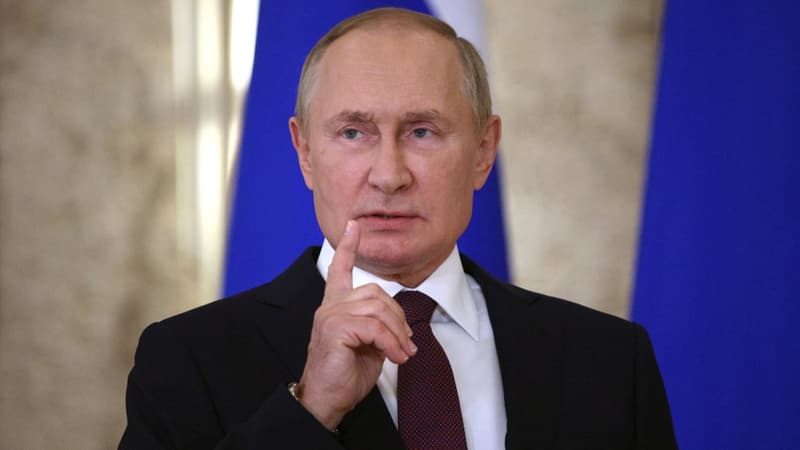On Friday, it will be 2:00 p.m. in Paris, 3:00 p.m. in Moscow, when Vladimir Putin and representatives of the breakaway republics of Donetsk and Lugansk, as well as those of the occupied Ukrainian areas of Kherson and Zaporizhia, will ratify the treaties in the Kremlin annexation of these territories to Russia. This ceremony follows early pseudo-referendums whose results announced on Tuesday allowed the puppet leaders of these regions to request their accession to Russia.
If the international community does not recognize any of these ties, Vladimir Putin will still take the opportunity to make a speech after the exchange of signatures.
Celebration of an alleged victory on the Ukrainian front, praise for “Great Russia”, nuclear blackmail… What to expect from the Russian president’s speech?
A victory speech?
It was the Kremlin spokesman who formalized the news on Thursday. “Vladimir Putin will give a big speech” during the annexation ratification ceremony, Dmitry Peskov said.
According to our information, the president of the Russian federation will address the nation in the middle of the 1250m² Saint-Georges hall, under the Kremlin’s gilding and under 1300 kilo chandeliers.
Apart from this solemnity, Vladimir Putin will pursue a goal as specific as it is cynical: to turn disaster into success, and not lose face while his army is in the doldrums.
“There are political aspects, like using this ceremony and this speech to give a victory speech, saying: ‘Here we have saved these regions, we are protecting them and then this operation is already a success and fully justified,'” he explained. Colonel Michel Goya, Defense consultant for BFMTV.
“It is a way for Russia to change the nature of the conflict: we forget about the special operation that was an external operation, there we go to the defense of the homeland. (…) We are pushing back the borders of the homeland, so now everything that happens in these occupied Ukrainian areas becomes a matter for the Russian nation and justifies the mobilization of all the forces of the Russian nation”, analyzed the officer .
Take out the “nuclear umbrella”
To justify the merits of the war itself, and to justify a “partial mobilization” that has slipped badly since it was decreed last Wednesday, between mass exoduses, hostile demonstrations and recruitment failures. A double benefit for Vladimir Putin, who should try to push his advantage further.
Patrick Sauce, international affairs columnist for BFMTV, points out that the Russian president had already delivered a trailer for his next speech: “We had a little idea of what he was going to say when he spoke on Tuesday, about ‘rescuing populations'”. And it’s about saving them with the nuclear umbrella. There is nothing else. It will certainly be threatening in relation to those – well, generally speaking, the Ukrainian army, who would like to attack these territories.”
Vladimir Putin also warned that he reserved the right to use “all weapons” at his disposal – thus not excluding a nuclear attack – if “vital interests” and Russian territory were in danger. Suffice it to say that an attempt by the Ukraine to reclaim its lands, in Luhansk, Donetsk, Kherson or Zaporizhia, would fall entirely within this fallacious definition.
“If these four regions become Russian, they will be under the protection of Russian weapons, nuclear and many others, thermobaric bombs, etc,” said Colonel Peer de Jong, vice president of the THEMIIS Institute and former Colonel of the Troops of Marine.
These annexations even acquire an air of personal triumph for the Russian president, whose political career they usually crown. “Vladimir Putin has always wanted ‘Great Russia.’ It so happens that tomorrow it will be expanded by several thousand square kilometers”, commented Patrick Sauce.
pose as a man of peace
Finally, the operation gives him one last space to try to restore his image and give the impression that he is emerging victorious from a game that seems lost on the ground, or at least badly started.
“Somewhere he will call for the war to stop, for the fighting to stop,” Peer de Jong said.
It must be said that with these adjuncts Vladimir Putin could argue that his army has at least partially fulfilled the mission assigned to it. “But the Ukrainians will not allow them to do it,” summed up the vice president of the THEMIIS Institute.
After the celebration of these referendums sought by the Russian authorities in the occupied zones, the Ukrainian president, Volodymyr Zelensky, has also ruled out any cessation of hostilities as it stands. Speaking to his fellow citizens on Telegram on Tuesday night, he warned: “We will act to protect our people: both in the Kherson region, in the Zaporizhia region, in the Donbass (and also) in the currently occupied areas of the region of Kharkiv and Crimea”.
What interest does it have then that Vladimir Putin makes an offer that he knows will be rejected by his adversary? This is because, according to Peer de Jong, the challenge now is to draw the attention of a completely different interlocutor: “The message is also addressed to NATO and to the United States, to say: ‘We have achieved our objectives, let’s stop this’ “. war. The goal is for the United States to stop helping the Ukrainians who could not continue without this help.”
For the time being, however, the dictator’s wish seems like a fantasy, as the international community grapples with the aggression perpetrated against its Ukrainian ally.
Source: BFM TV


